Photos by Phil Butland and Jaime Martinez Porro



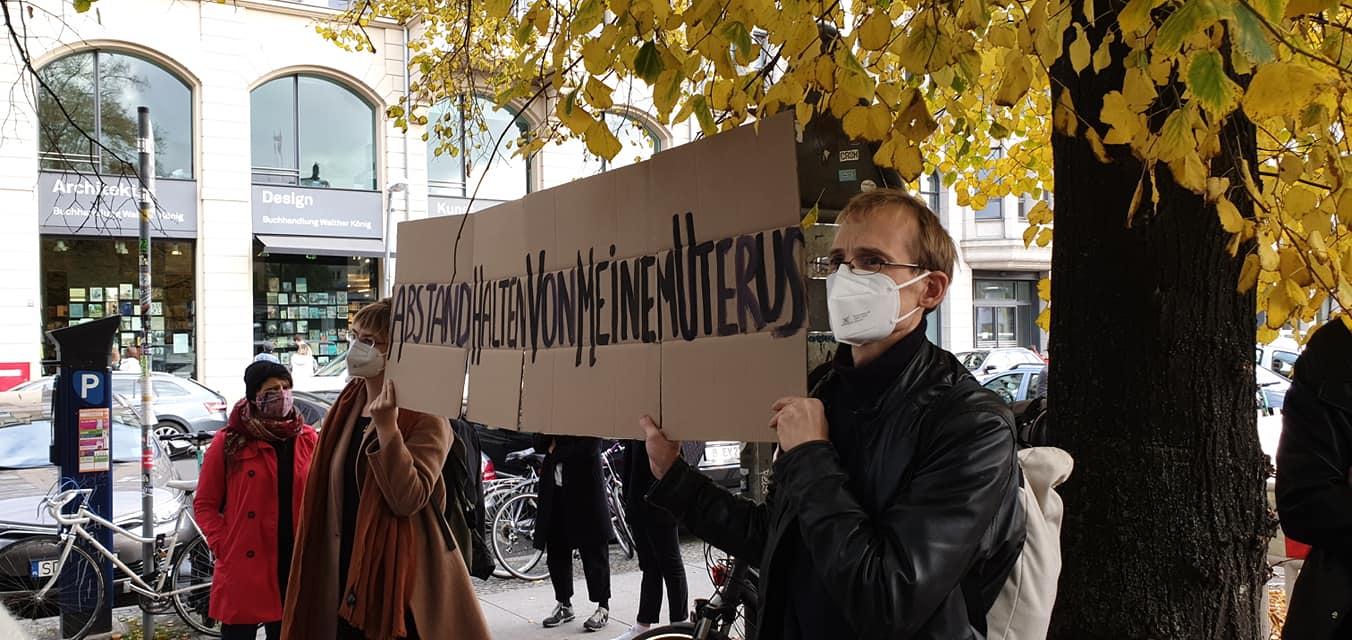

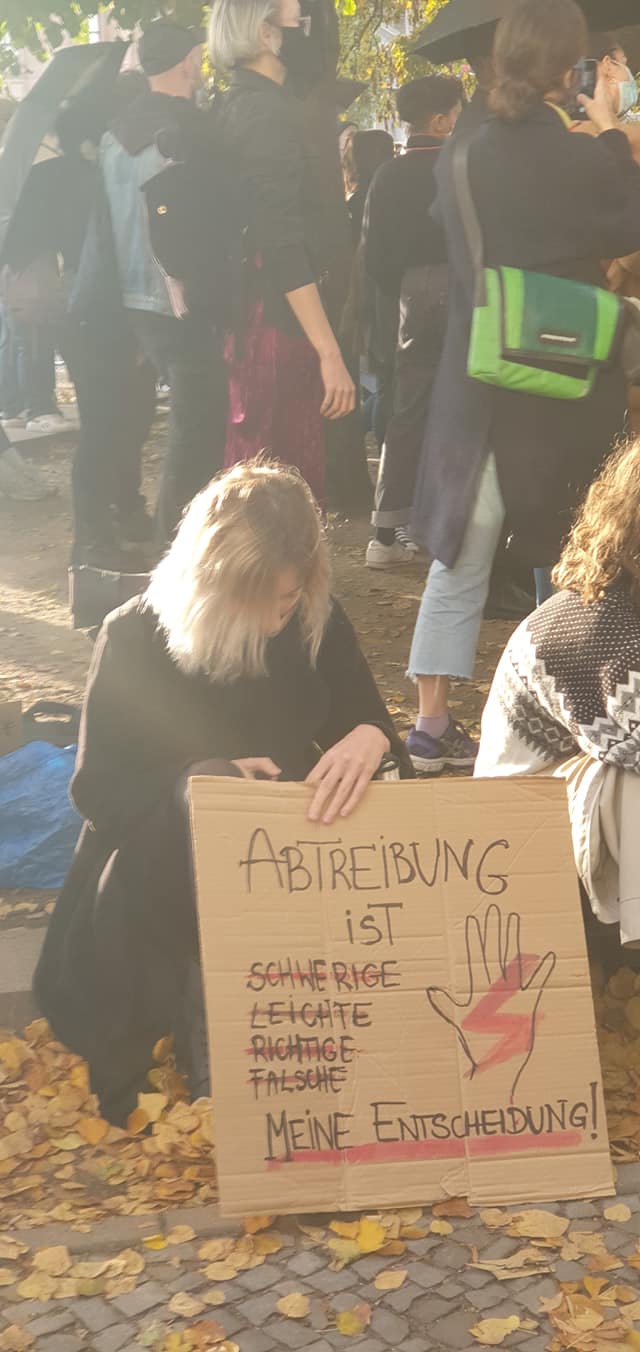



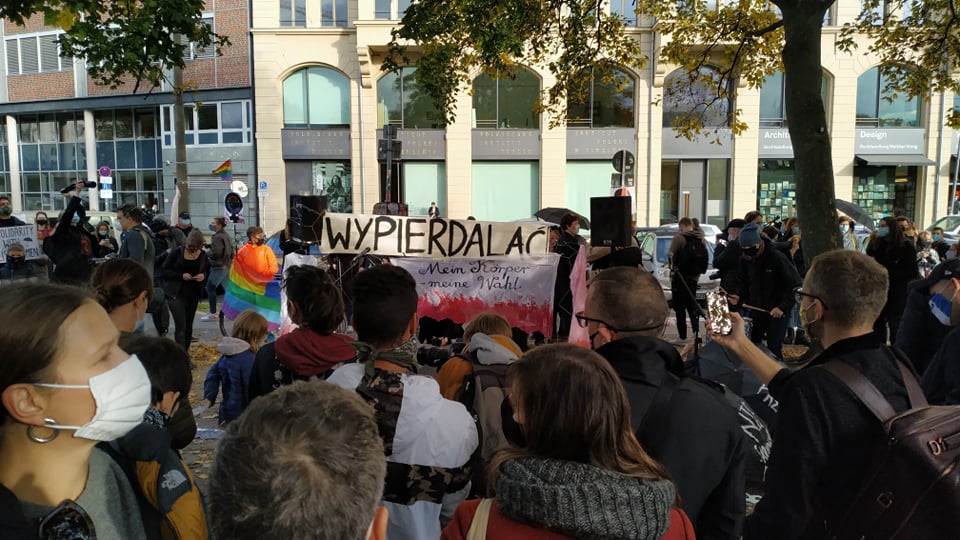
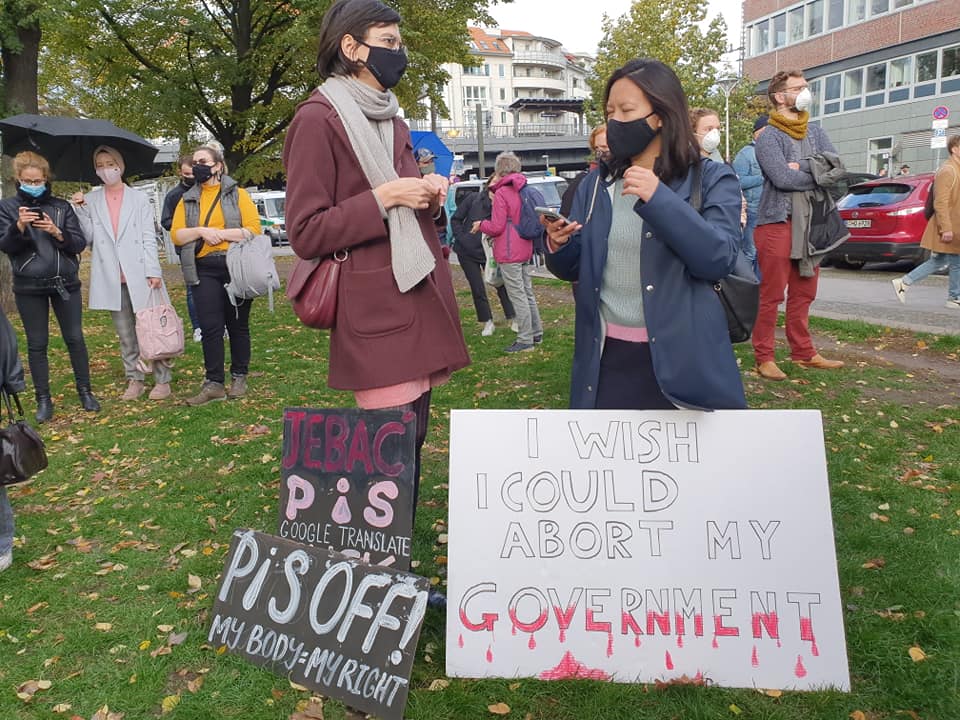
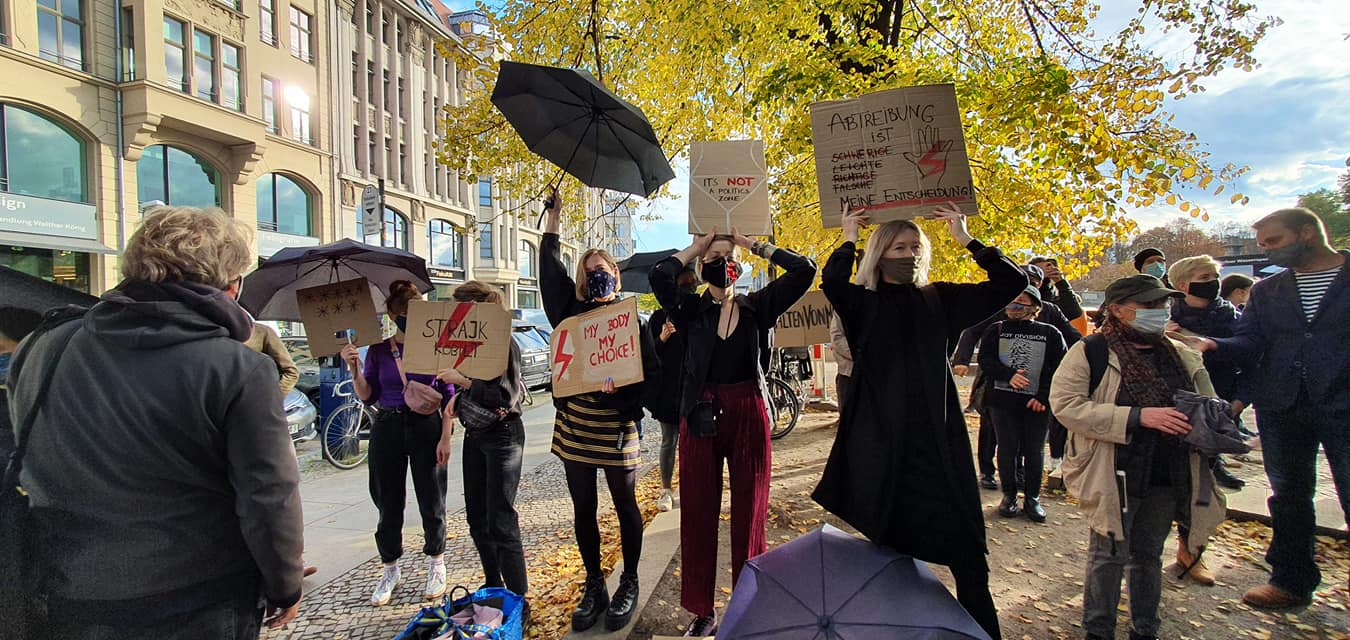

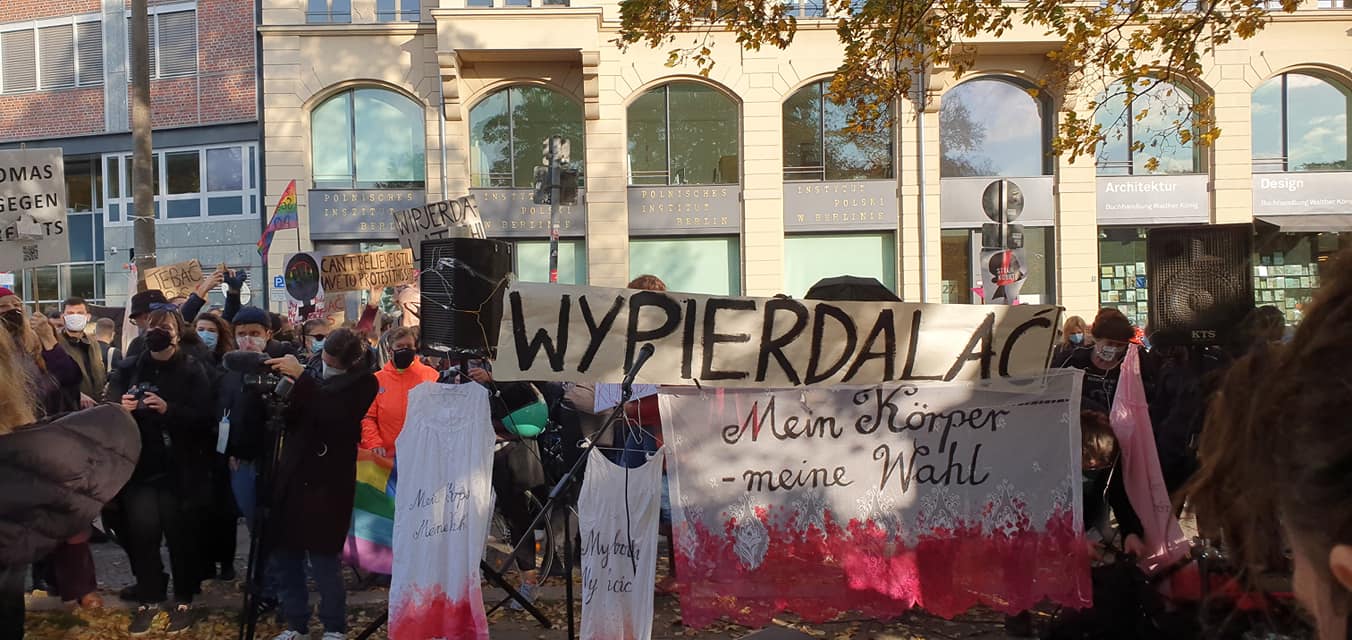
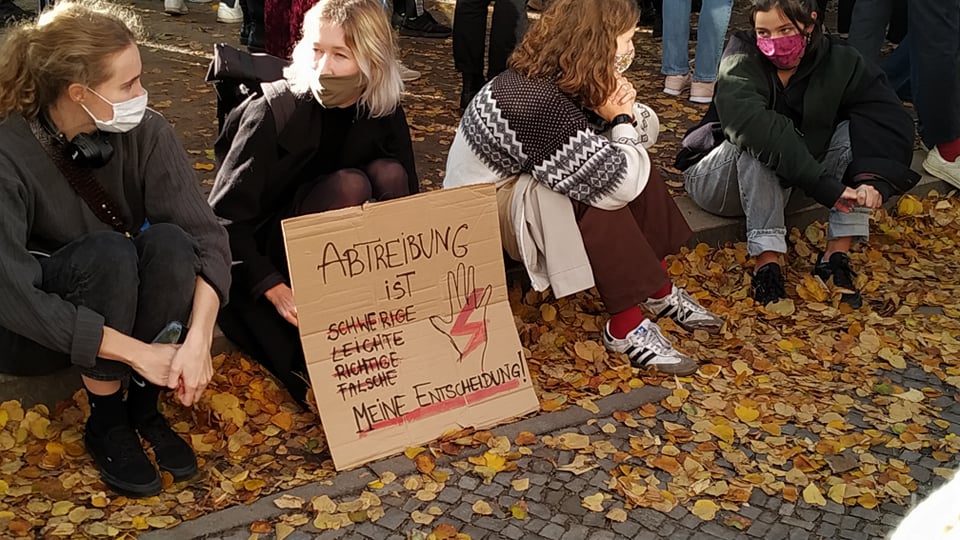



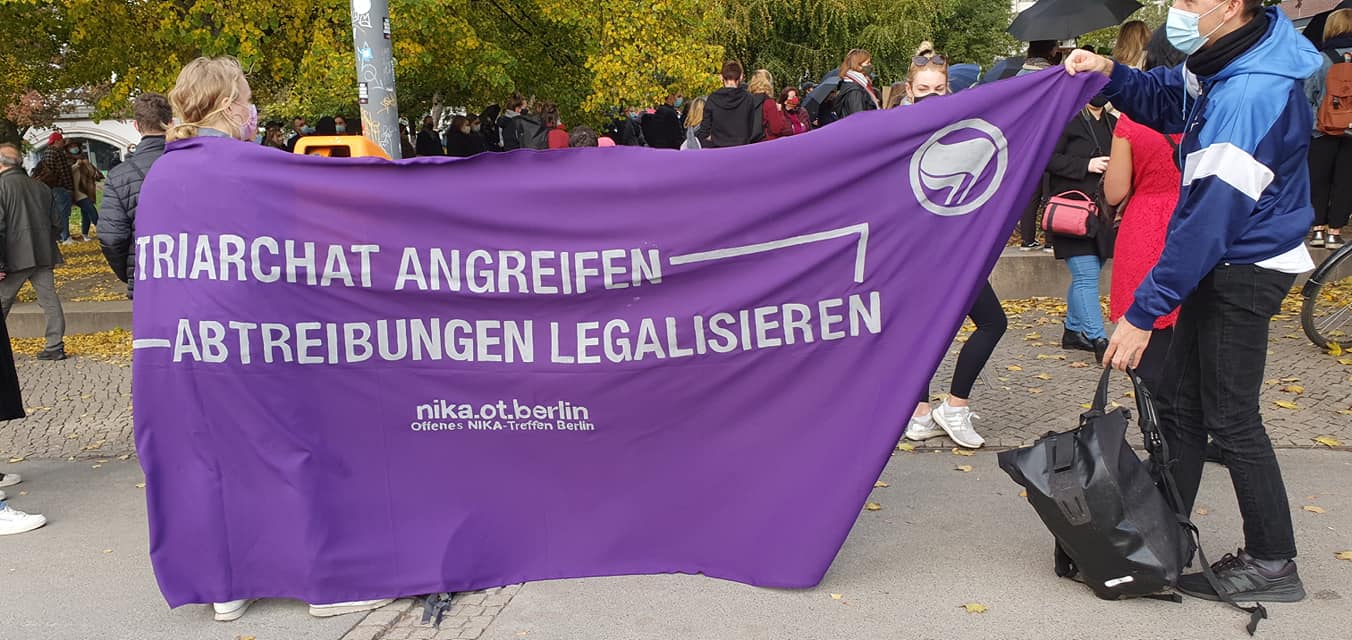

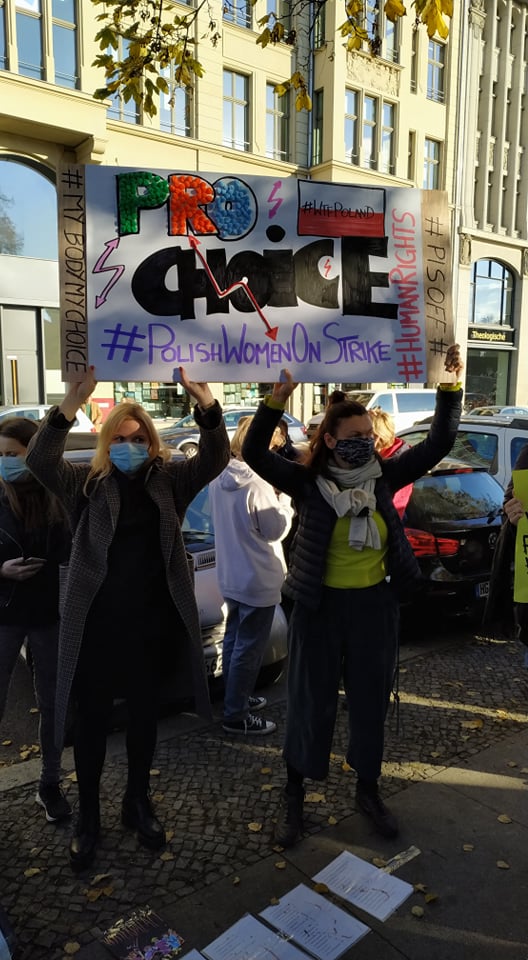
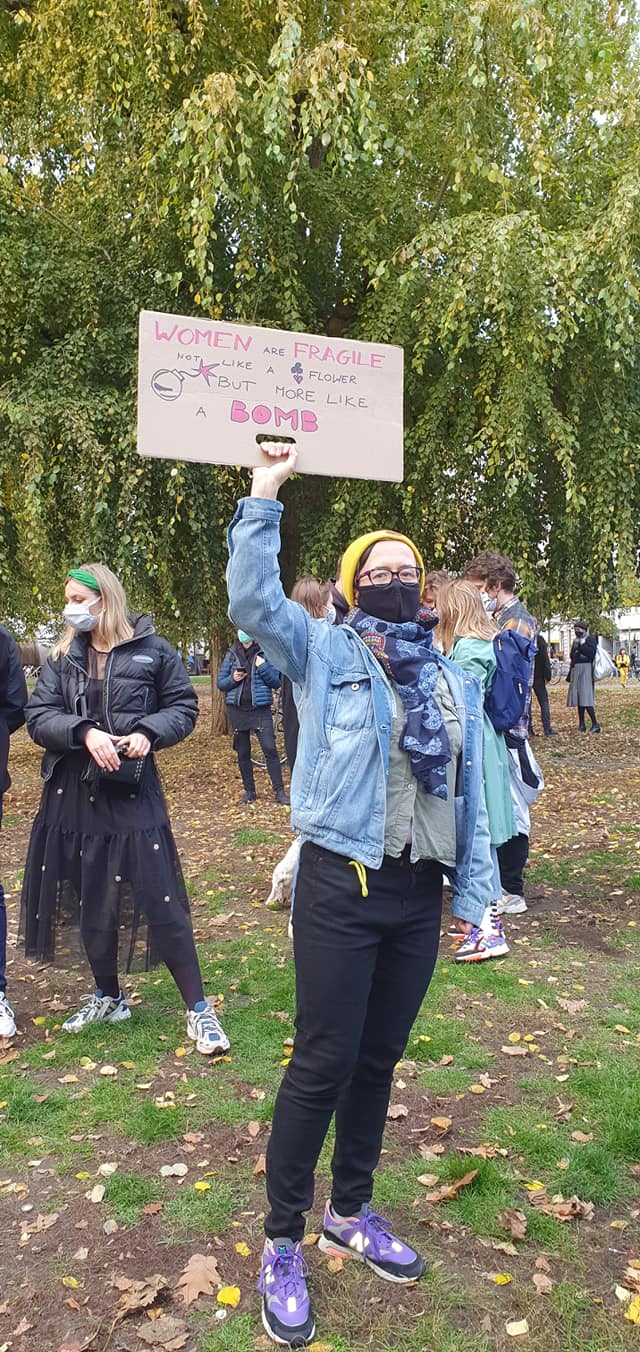
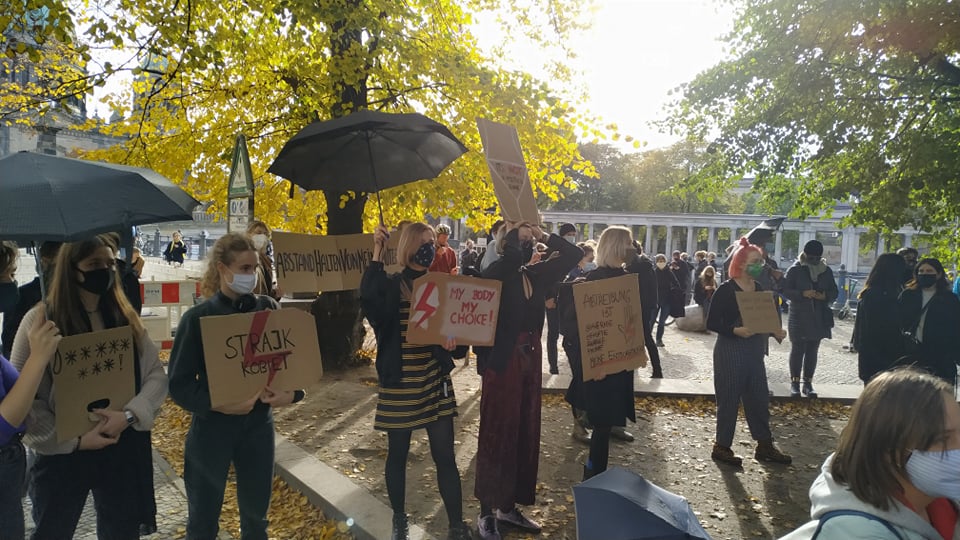
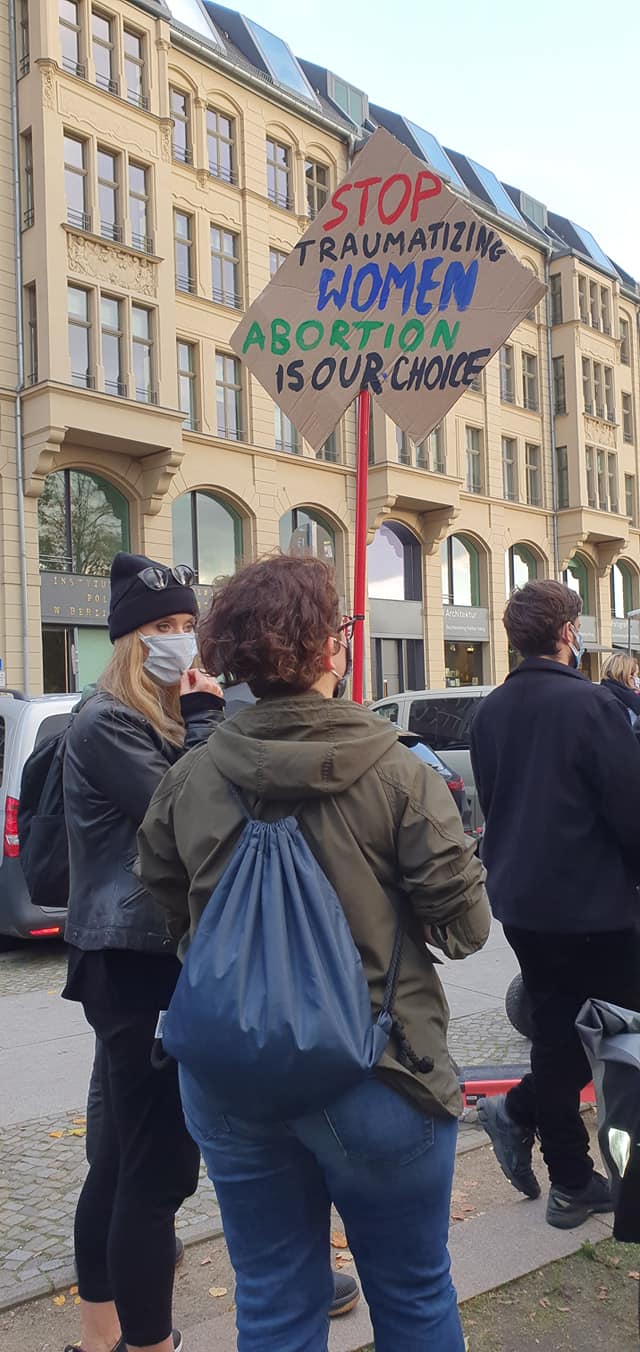
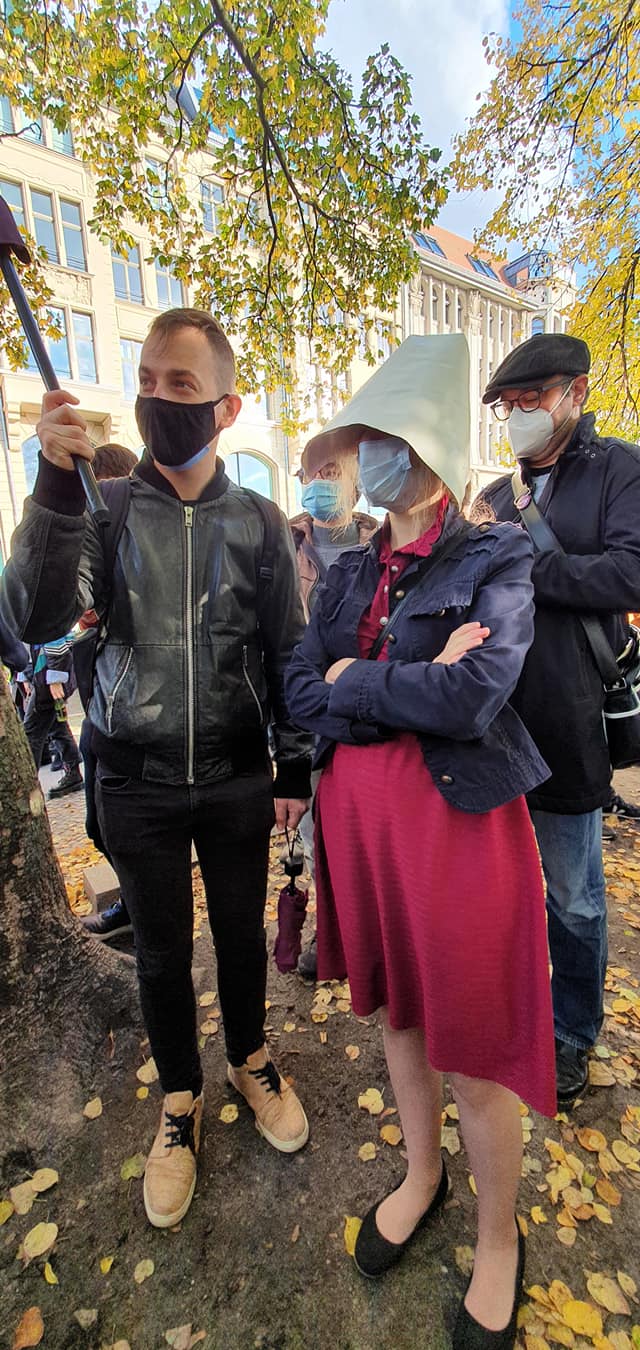
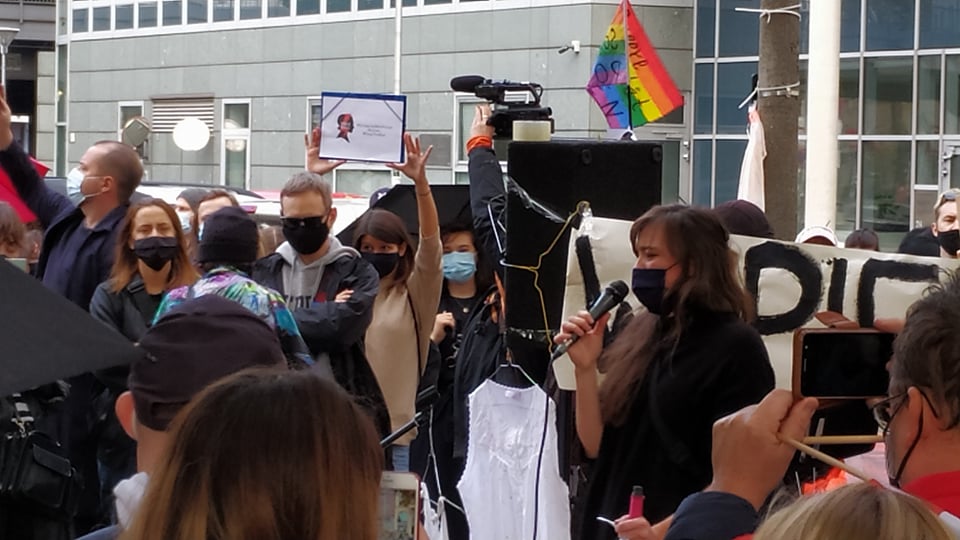


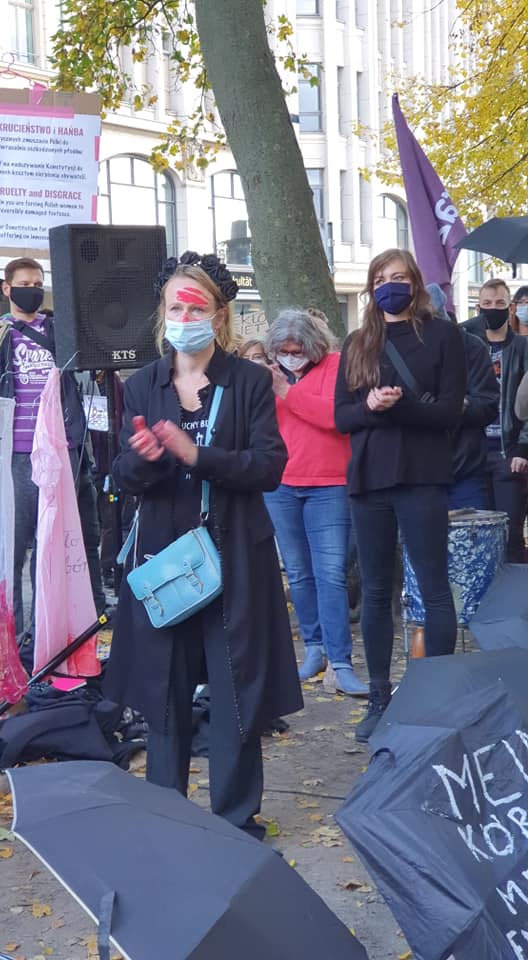

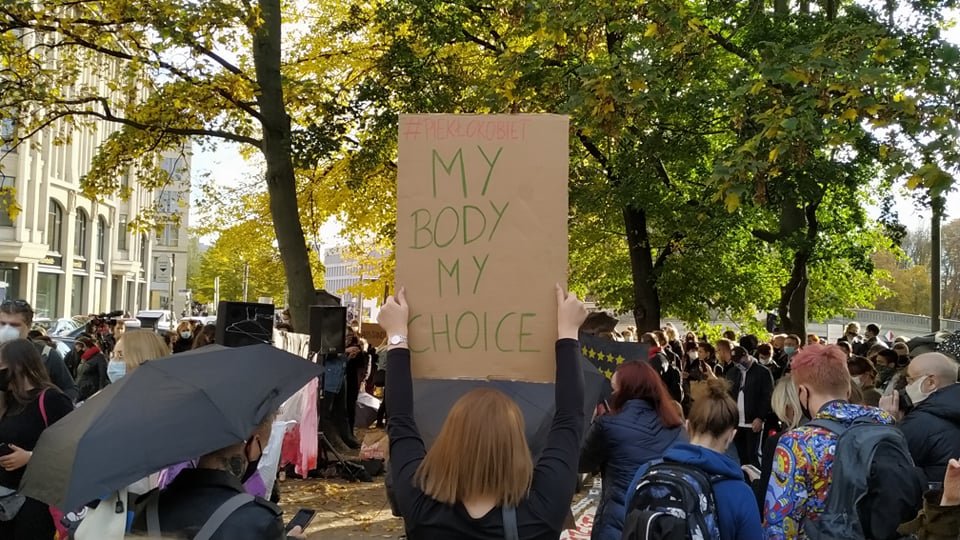
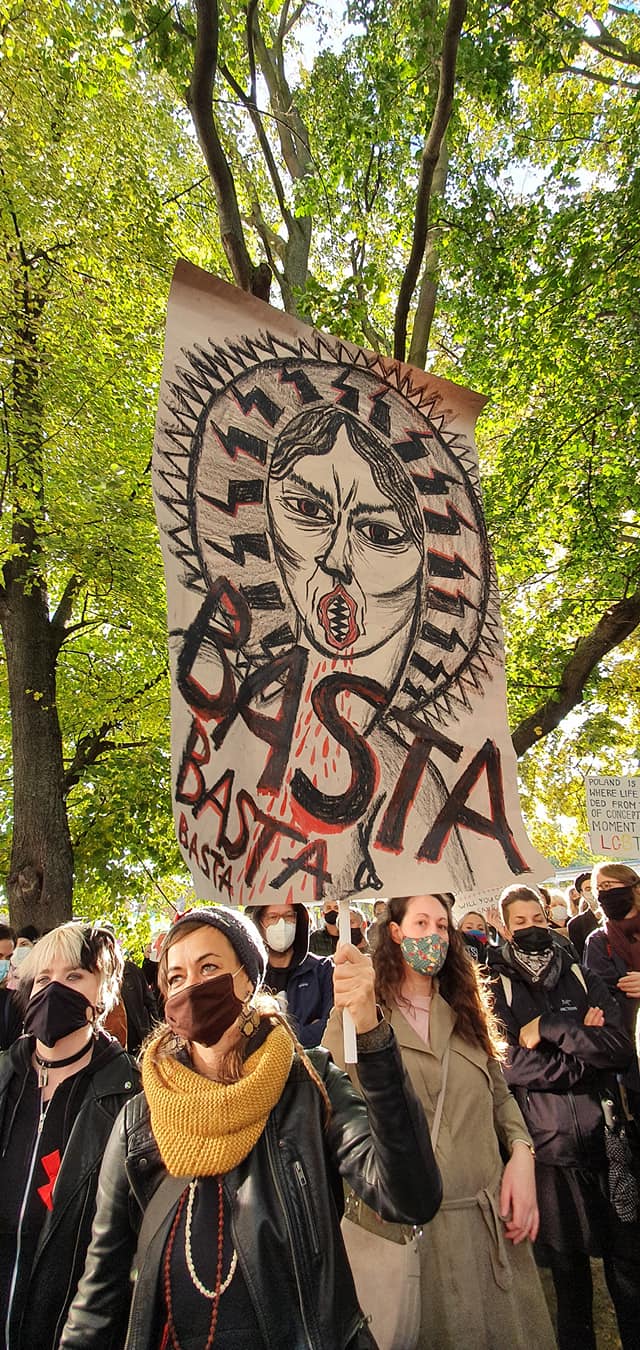
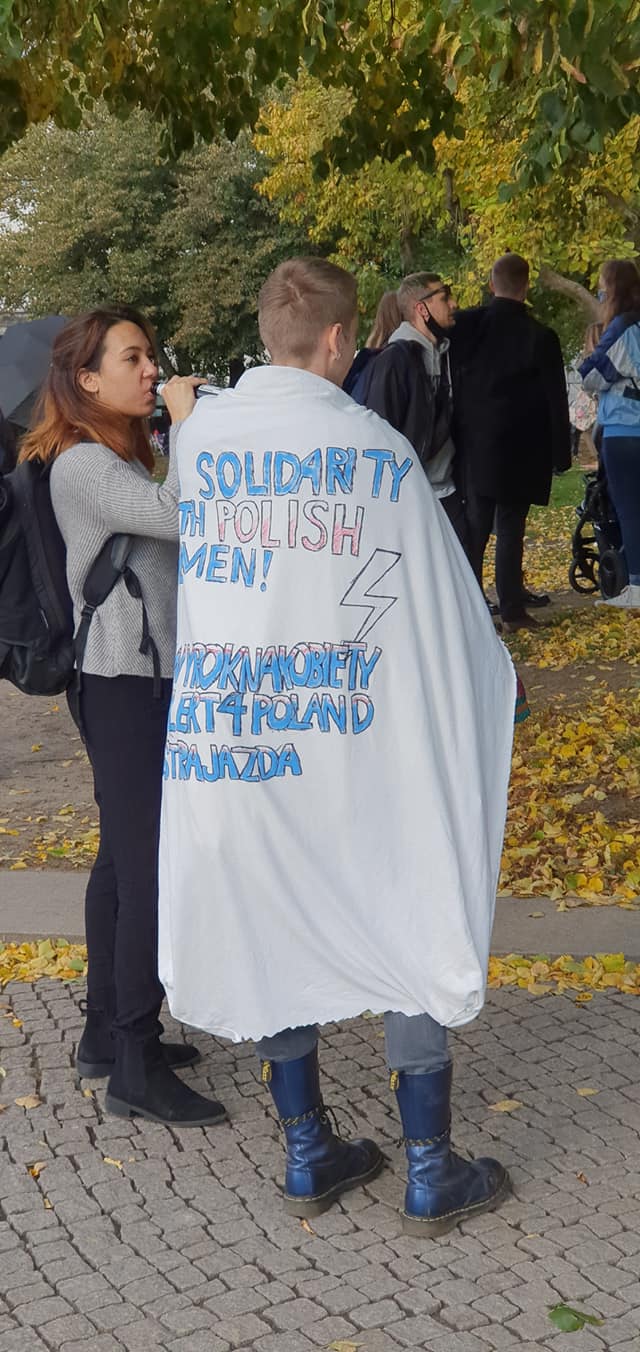
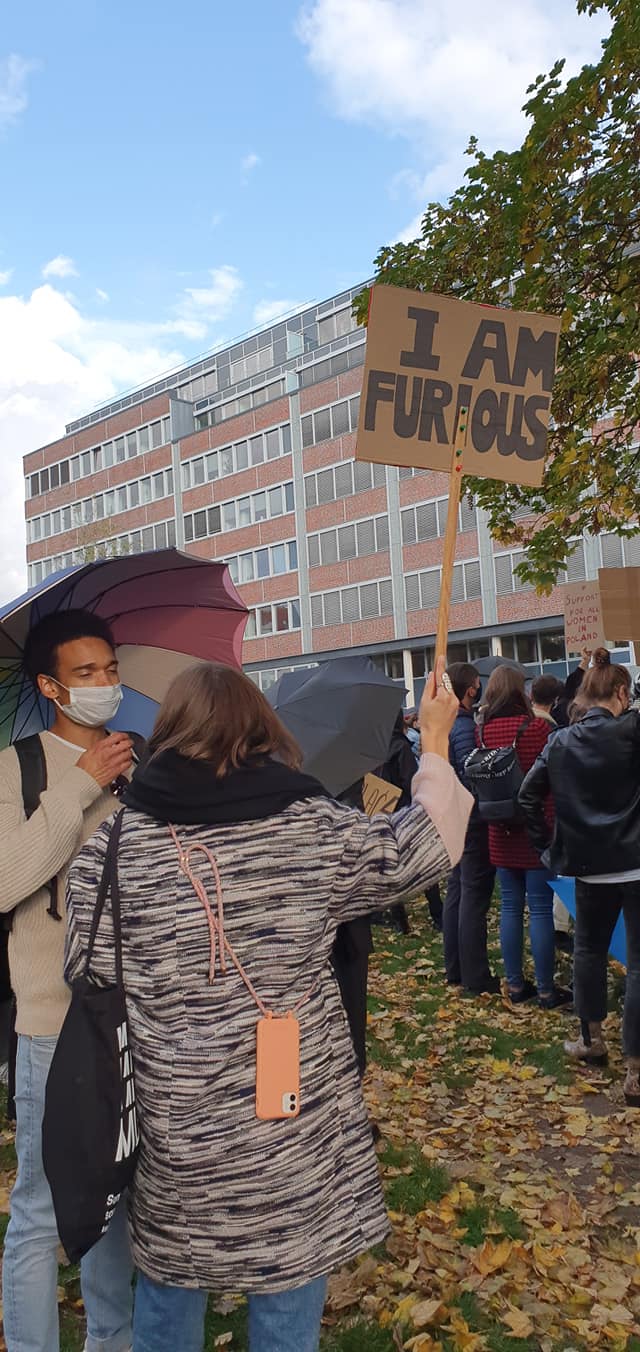





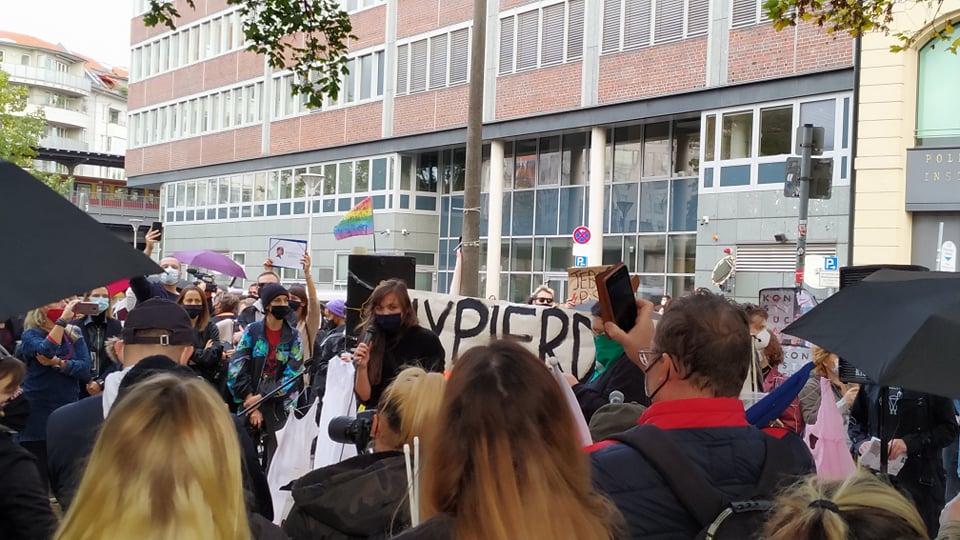
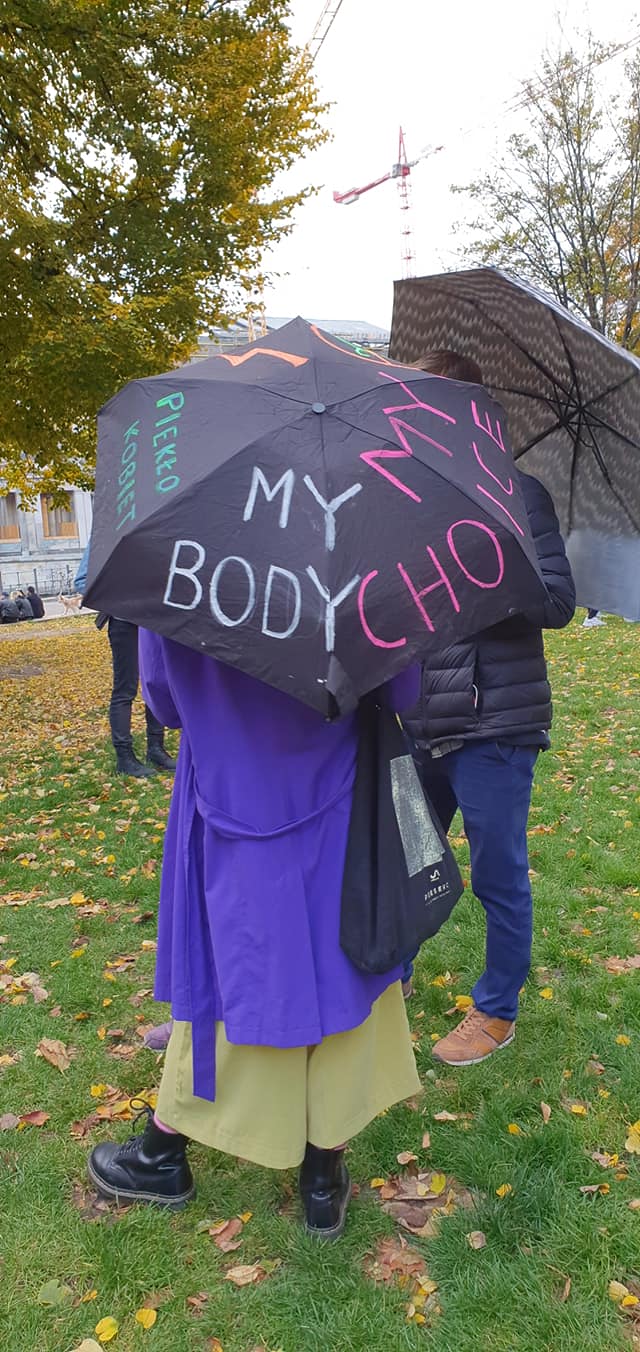

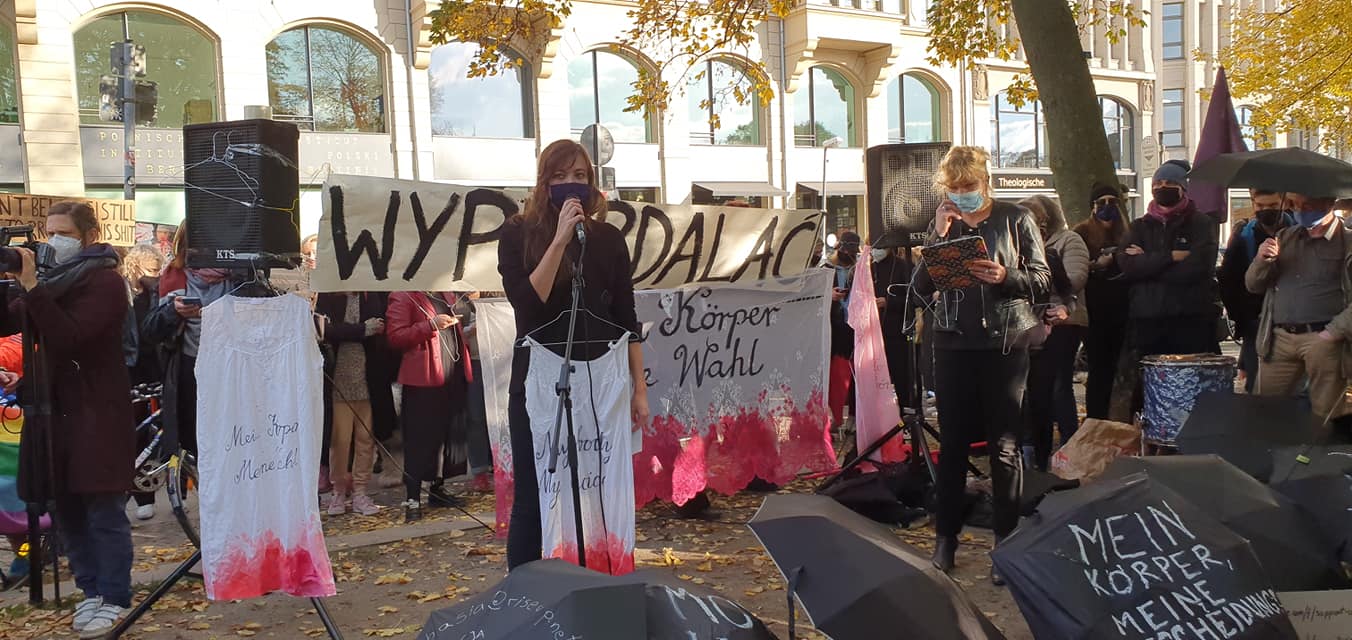

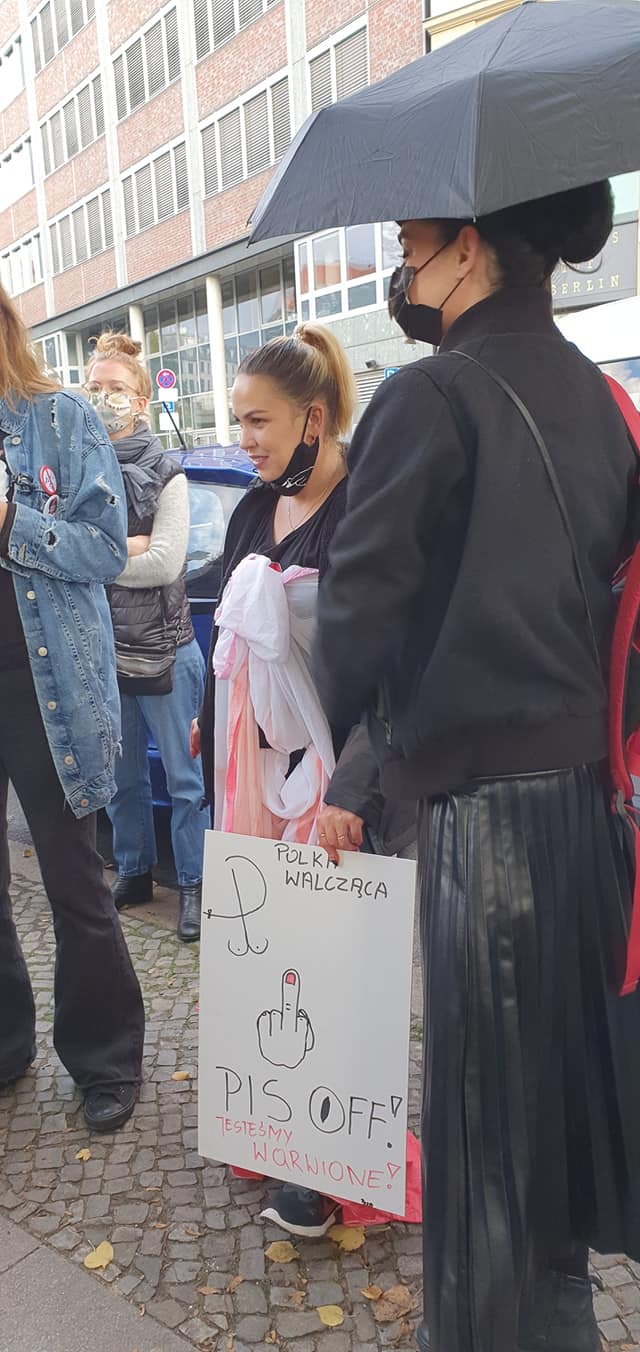



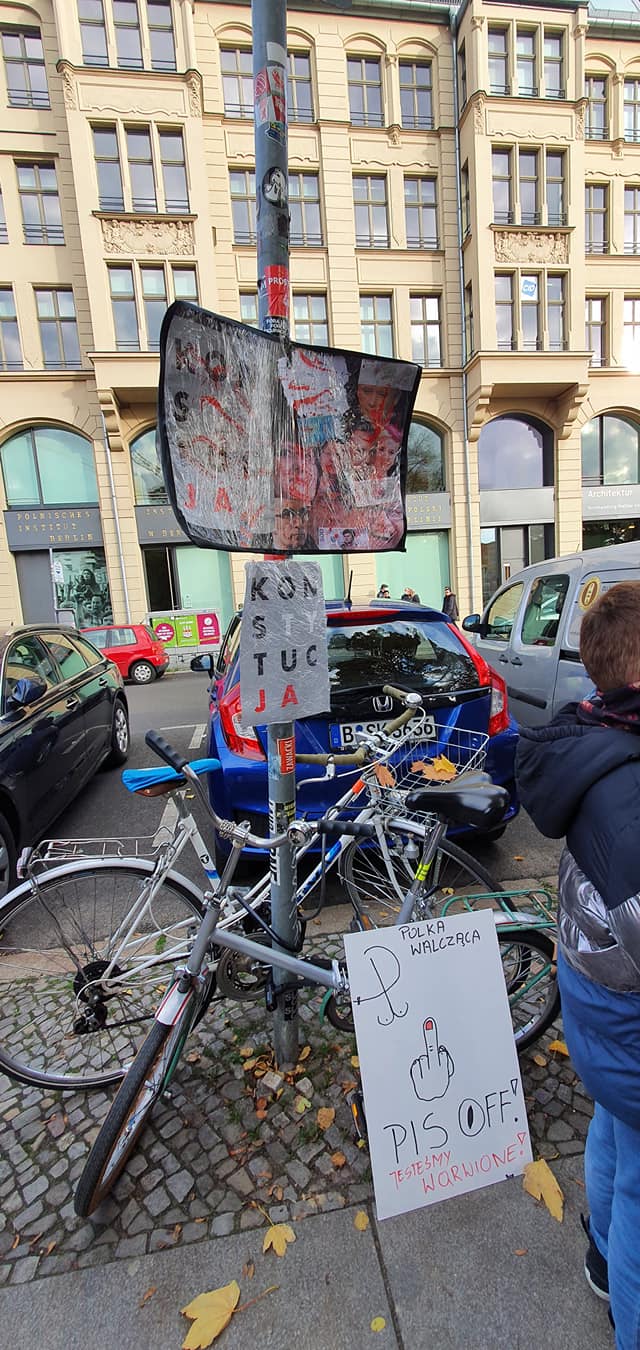

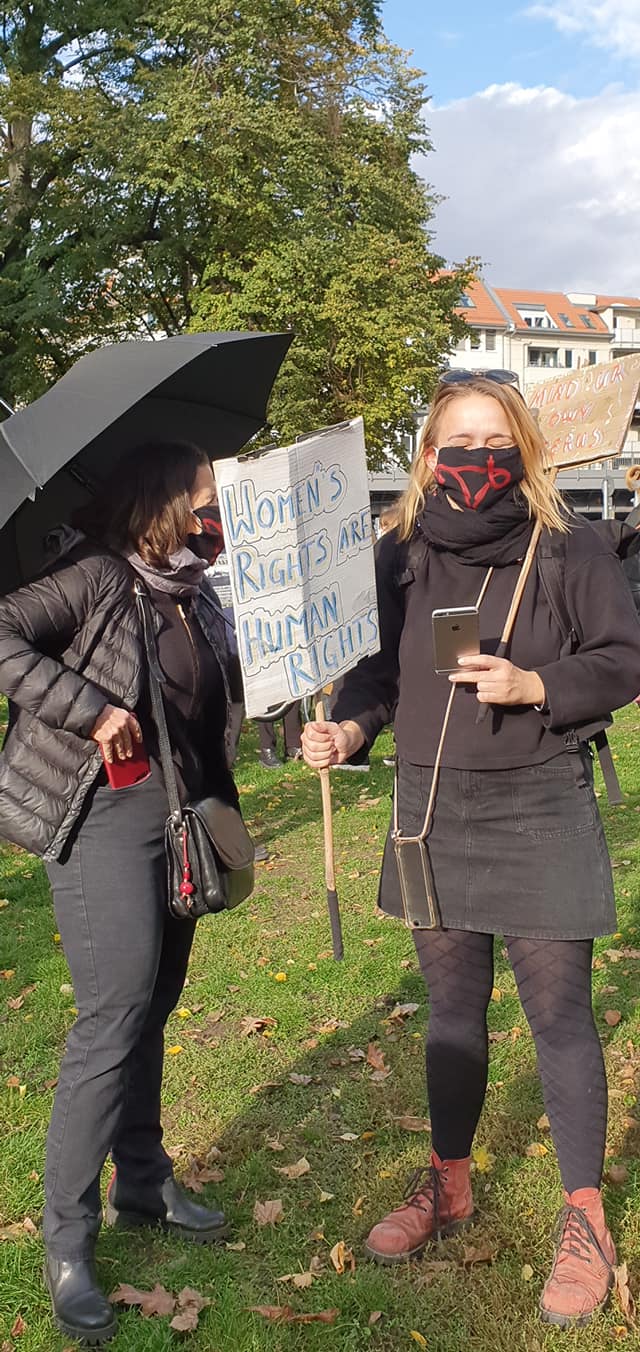


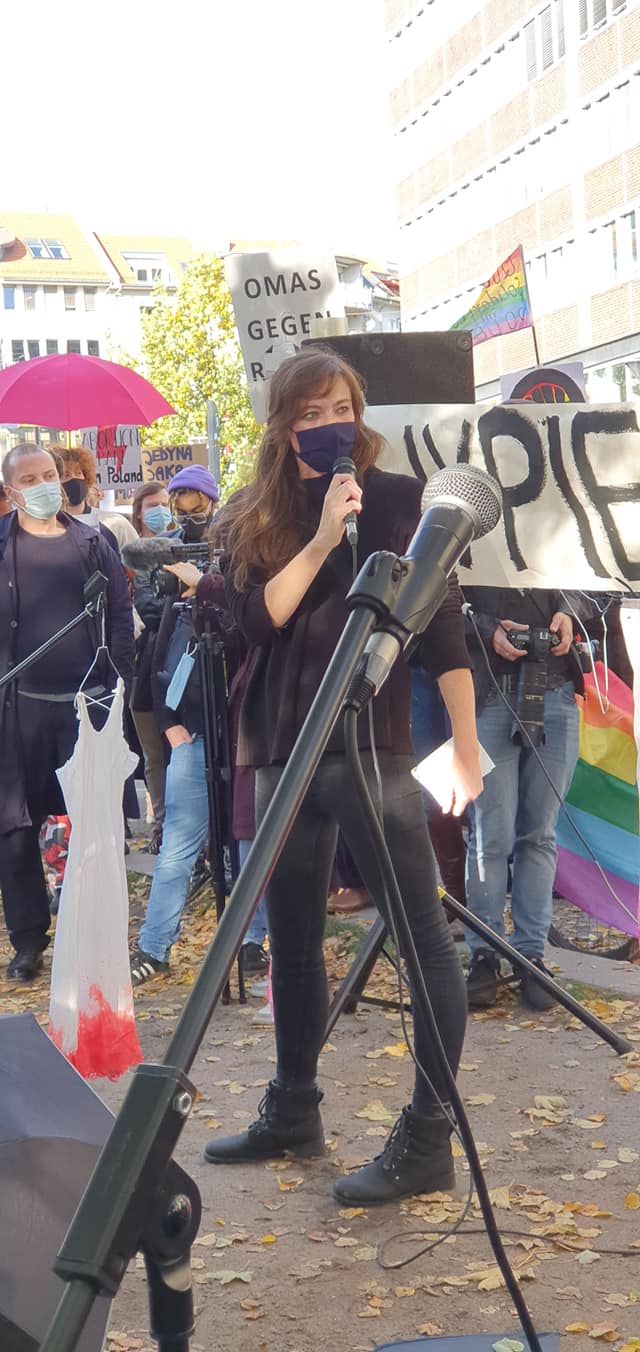
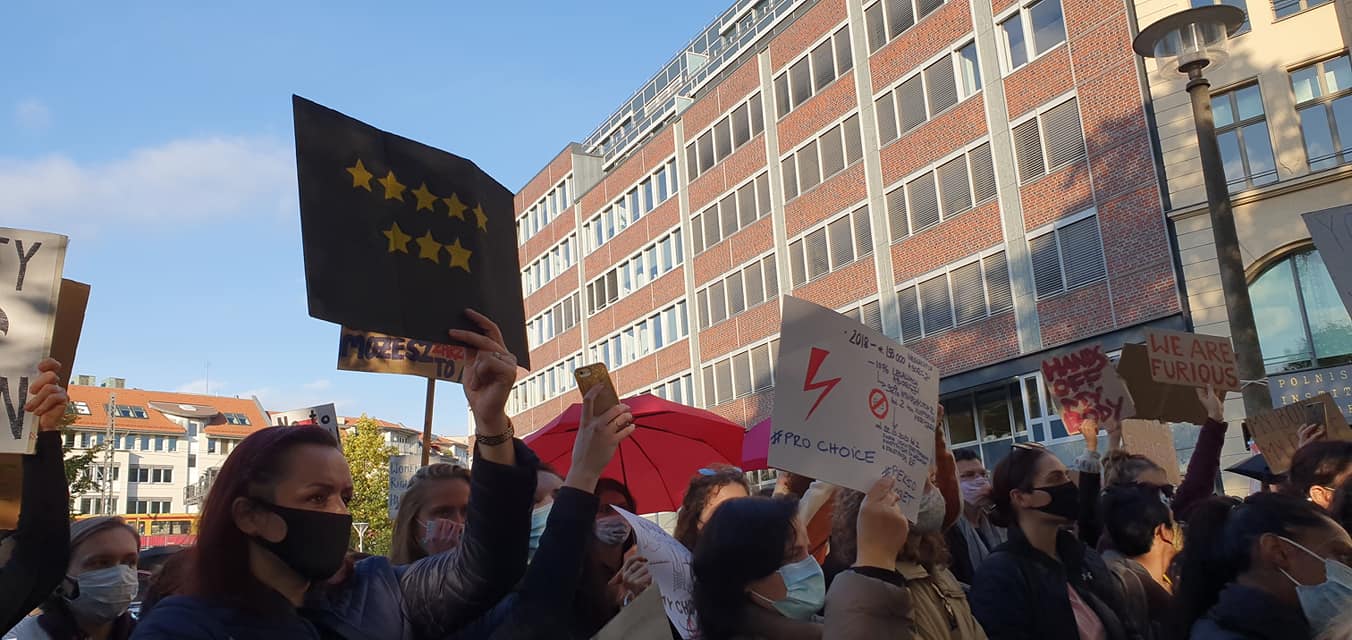
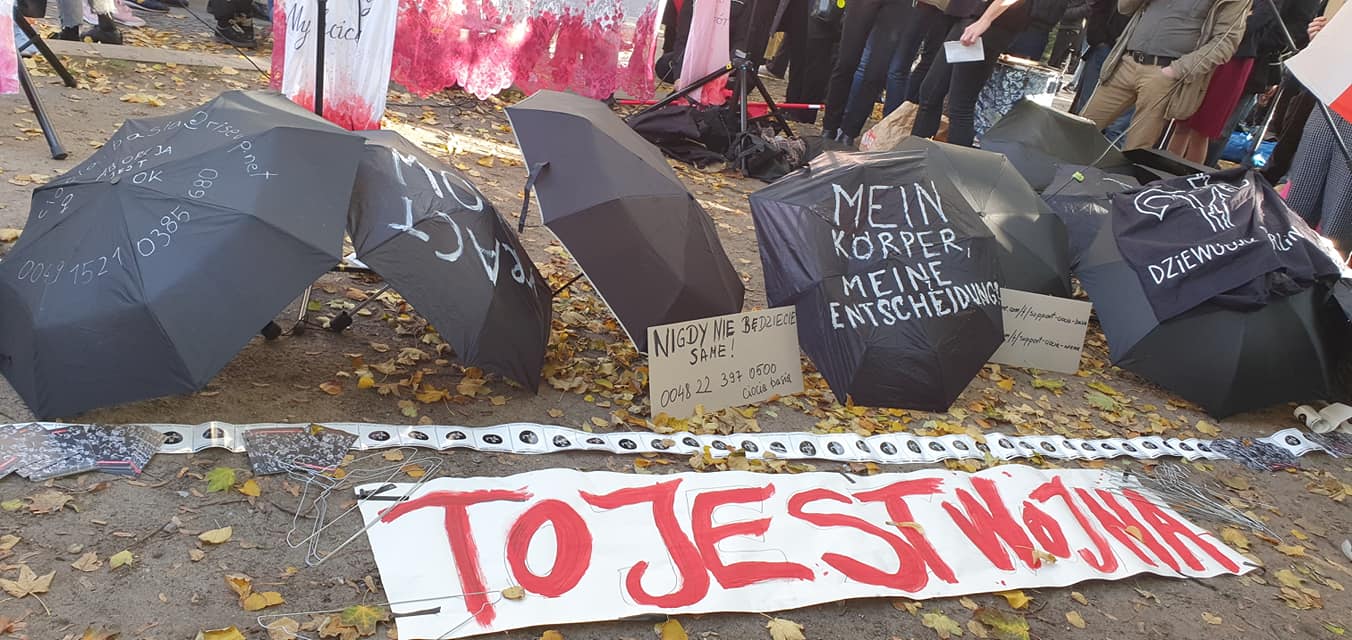
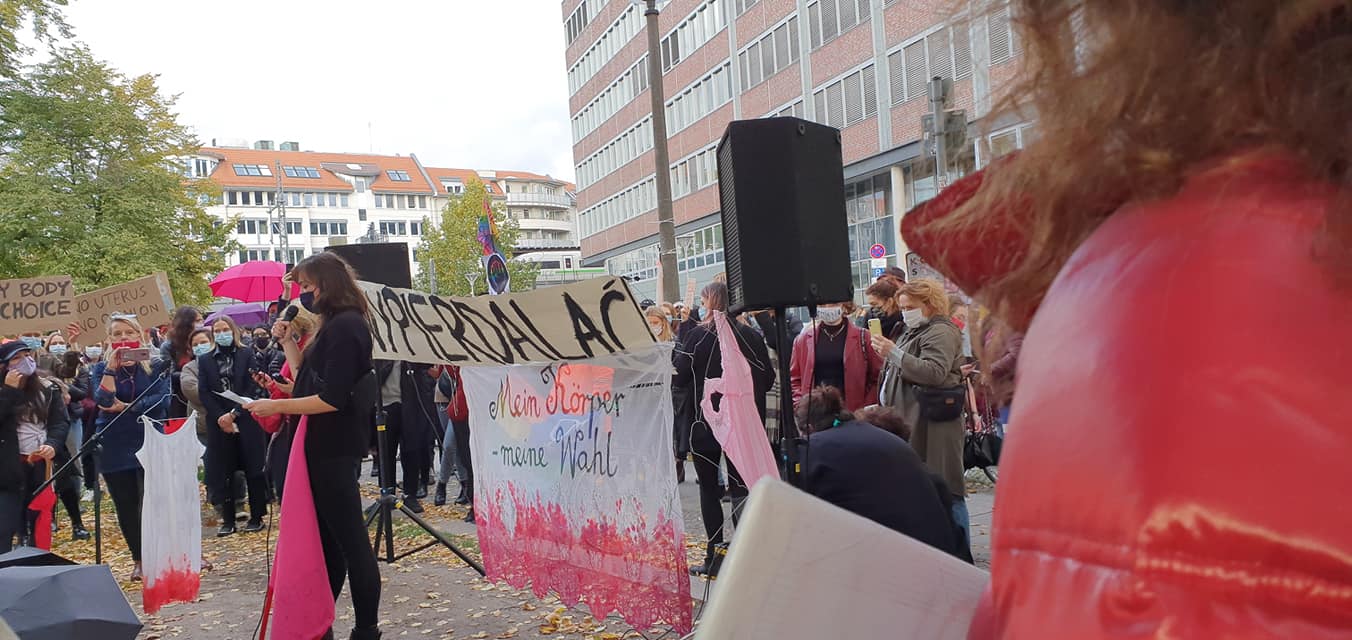

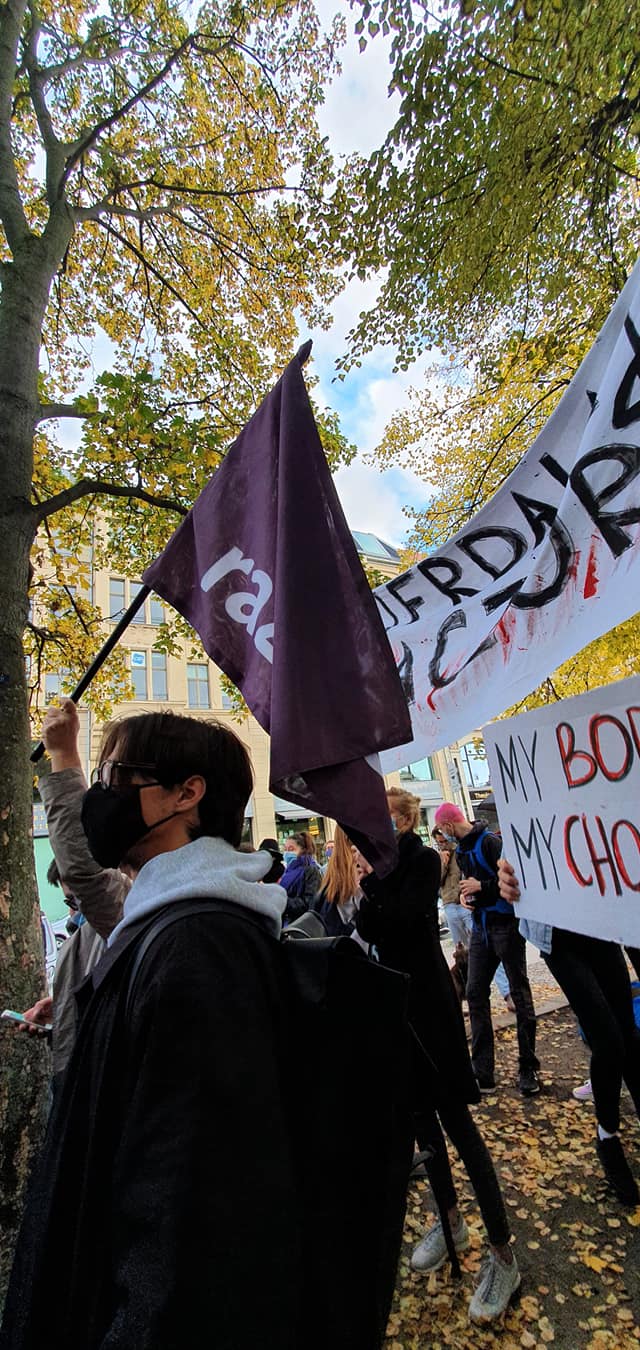

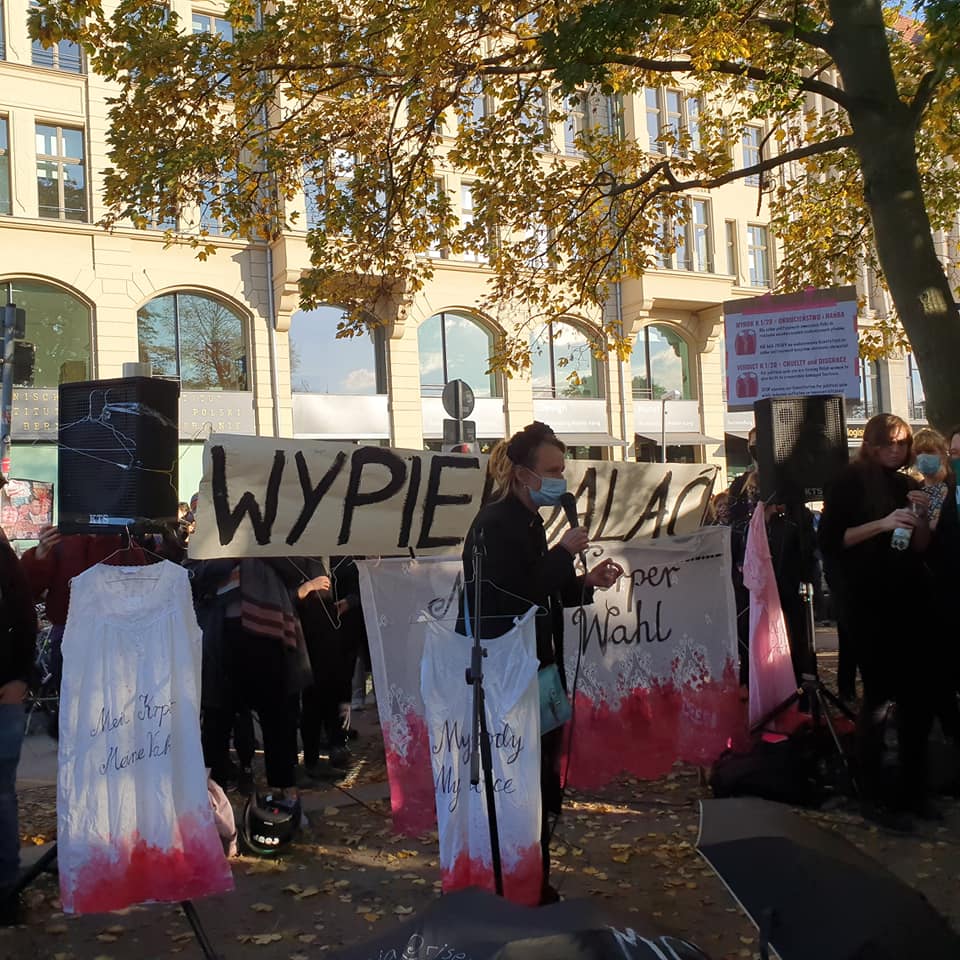
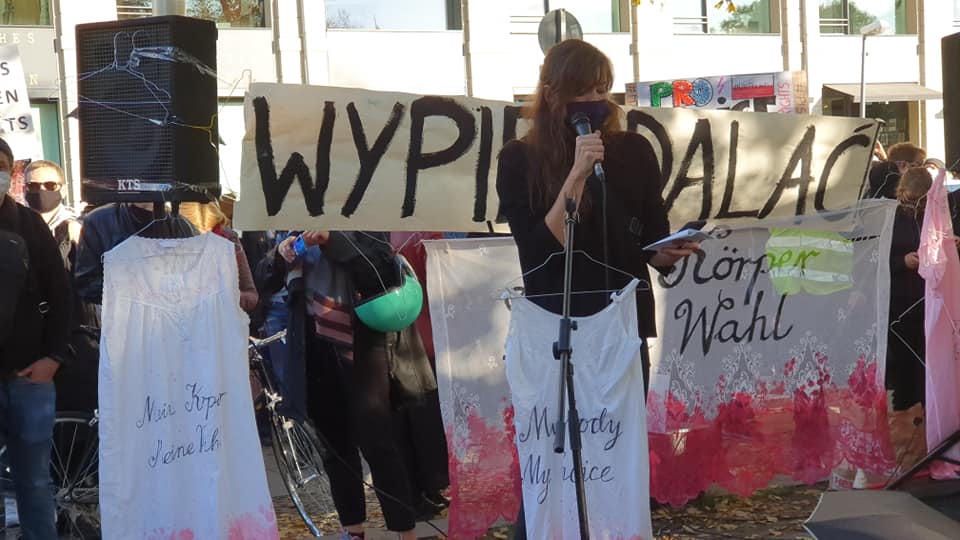

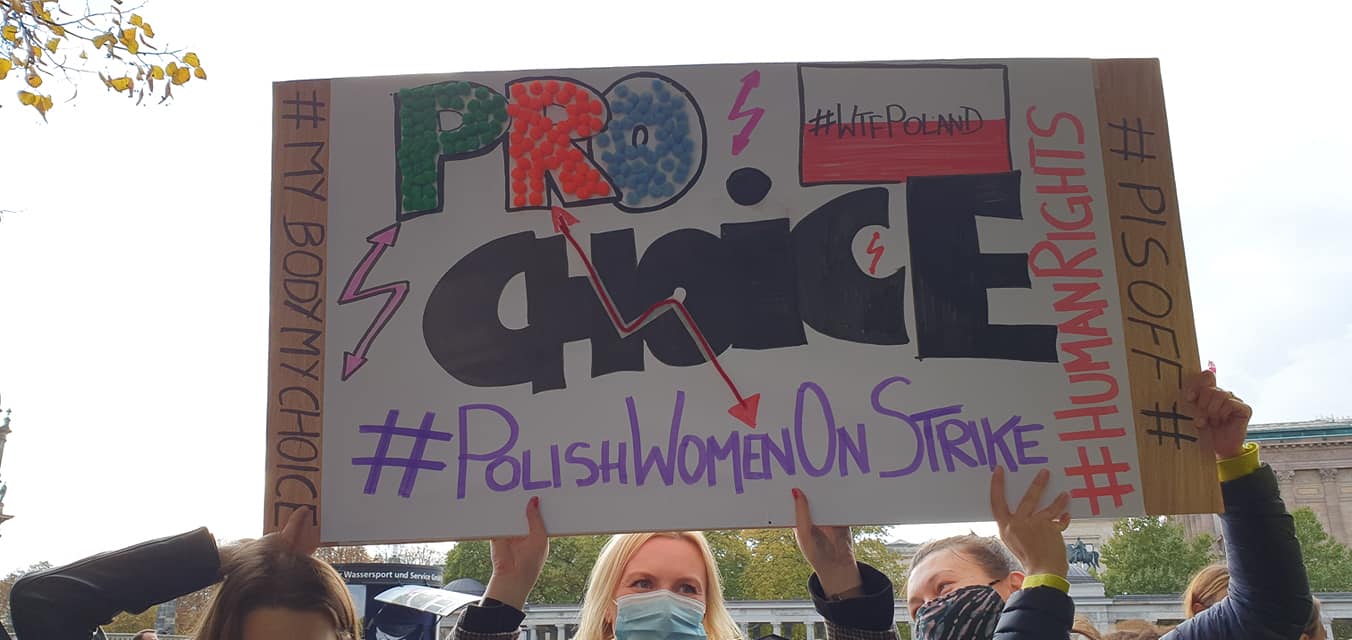
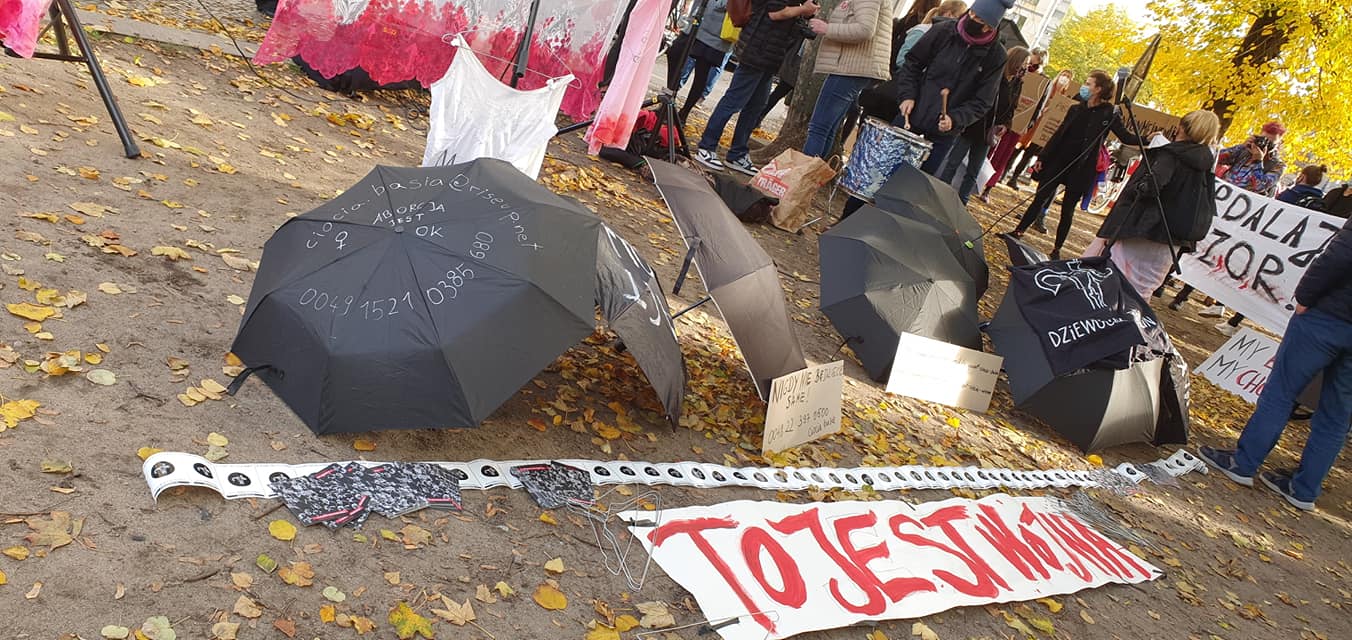
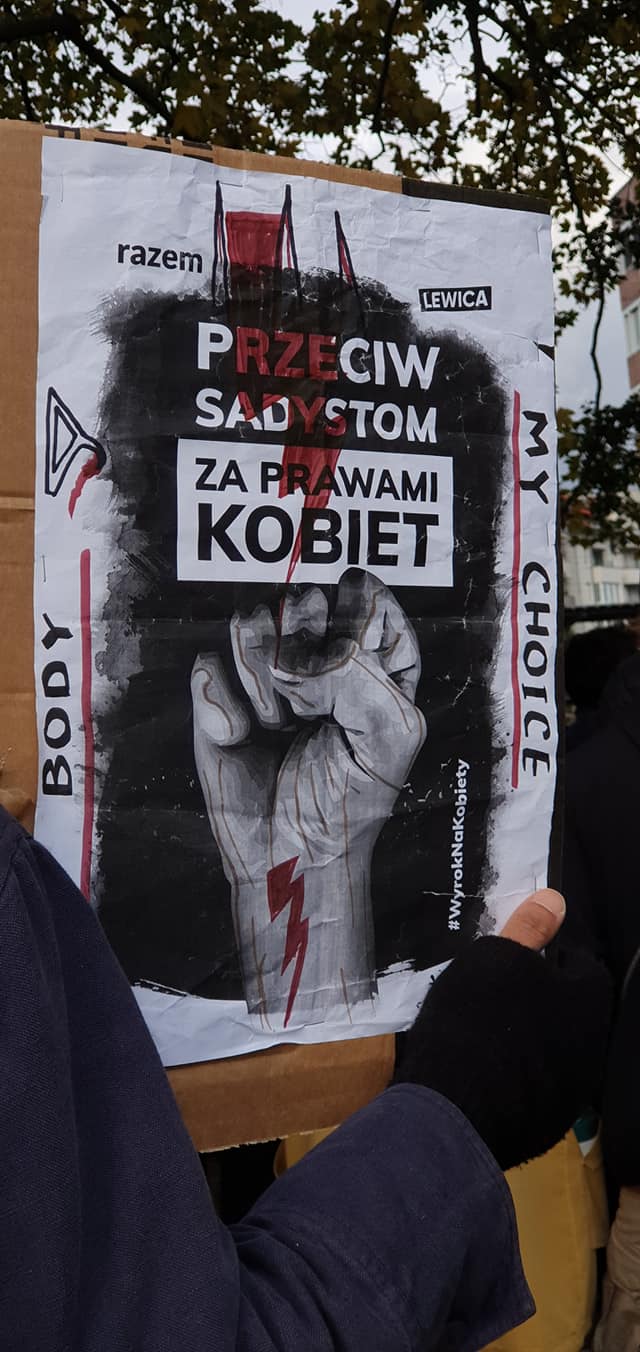


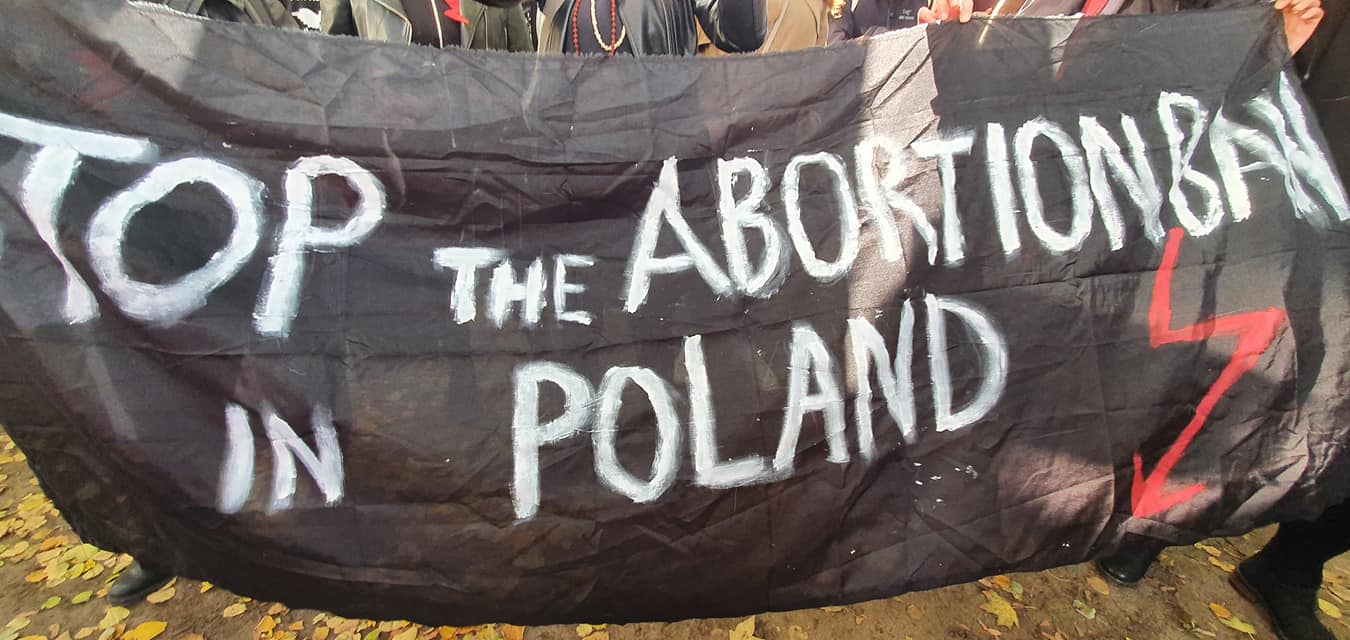
Video: Jamie Martinez Porro
https://video.wixstatic.com/video/fe8979_66eab26fc364405ebfd0cb37d3294e7f/360p/mp4/file.mp4
Photos by Phil Butland and Jaime Martinez Porro Video: Jamie Martinez Porro https://video.wixstatic.com/video/fe8979_66eab26fc364405ebfd0cb37d3294e7f/360p/mp4/file.mp4
The Left Berlin
24/10/2020
Photos by Phil Butland and Jaime Martinez Porro





































































Video: Jamie Martinez Porro
https://video.wixstatic.com/video/fe8979_66eab26fc364405ebfd0cb37d3294e7f/360p/mp4/file.mp4
Today the Polish public was shocked.
Even though Polish abortion laws were already some of the strictest in the EU, the Law and Justice Party-controlled Constitutional Tribunal ruled that aborting a pregnancy, even in the case of the foetus being seriously and lethally malformed, violates the articles on the human rights, freedom, and dignity of the constitution of the Republic of Poland.
The ruling was announced by the chair of the Constitutional Tribunal, Julia Przyłębska. The motion for the law to be examined by the Tribunal was made by a group of Polish MPs from the Law and Justice, Confederation, and Polish People’s Party-Kukiz’15 parties in 2019.
Today’s ruling will have a catastrophic effect on the quality of life and medical care of Polish families. Regardless of the damage and state of the foetus, the pregnancy will be forced to continue until a miscarriage or other natural conclusion; even in the case of the foetus being diagnosed to be unable to survive birth or to die shortly afterwards.
This sentences pregnant persons to incredible mental and physical suffering. Fear, several months of mourning in situations where the unviable foetus is forced to remain in the womb until natural birth, births which end only in watching a child die in agony before a funeral everyone knew was coming.
This new law will only create new forms of suffering. Doctors may start to refuse to even diagnose the state of pregnancies in fear that any negative diagnosis may lead to an illegal termination of pregnancy. Access to full modern diagnostics and medical care for parent and foetus will likely be severely affected or even completely removed. Children with problems that can be easily treated or solved by medical care and surgeries in-utero will receive no such care, due to the risk of accidentally inducing a miscarriage during the procedure. Additionally, this lack of information about the pregnancy will result in even more unnecessary stress for women.
Let us remember that before this ruling, abortion according to Polish law was only legal in three cases:
1) the pregnancy is a risk to the life or health of the pregnant person
2) prenatal or other diagnostics indicate a large likelihood of heavy and irreparable damage to the foetus or an untreatable disease endangering its life
3) there is reasonable concern that the pregnancy has come about due to a criminal act (Dz.U.1993.17.78 – Ustawa z dnia 7 stycznia 1993 r. o planowaniu rodziny, ochronie płodu ludzkiego i warunkach dopuszczalności przerywania ciąży).
Even though up until today abortion was legal only in these three aforementioned cases, those who were legally entitled to the procedure were met with intense opposition and even denial of the procedure. This violation of their rights was unfortunately facilitated by the collusion of the ruling Law and Justice Party and the Catholic Church, as well as both institutions’ flirtations with nationalist circles.
In an atmosphere of many-sided pressure and stigmatization, many doctors feared to offer any advice or carry out abortions, while others proudly announced their denial of lawful care for their patients for the benefit of their political image in the eyes of the nationalist Catholic government.
The timing of this ruling by the Constitutional Tribunal coinciding with the tightening of the public health regime and the placing of most of Poland under red zones due to the ongoing pandemic is not accidental. Restrictions put on public gatherings has removed the danger of protests and public backlash against this ruling such as those back in 2016 when a similar limitation of abortion rights was proposed by the incumbent government, when hundreds of thousands of protesters walked out into the streets.
Women have had their right to self-determination taken away and their voices have been ignored. But we are not folding our umbrellas!
Dziewuchy Berlin has called a protest action today (Saturday, 24 October) at 3pm in front of the Polnisches Institut (Burgstraße 27). The LINKE Berlin Internationals fully support this protest and urge everyone to take part
An online advert for a bathroom sublet has a lot to say about the state of housing in the city
Alice Lambert
23/10/2020

Earlier this week screenshots circulated of a post on one of Berlin’s many English-speaking community Facebook groups. The post, offered a room for €100 a week in the trendy Weserstraße area of Neukölln but it wasn’t a room it was a bathroom and the new tenant would have to bring their own mattress. The post also stipulated various conditions of the offer including a “house showering schedule”, which required the occupant to vacate their bedroom between the hours of 6:30 and 8am.
As the screenshot spread across Twitter, Instagram and Reddit, a few of the more outlandish details caused many to speculate about whether or not this was a genuine offer. It’s true many aspects of the advert did seem a little far-fetched: a three legged dog called Jodi; the claim the former tenant’s 4 ft 8 (142cm) girlfriend slept in the bath; and the suggestion that said bathroom would make a good home for a musician due to the fantastic acoustics. The characters took on a life of their own when followers of the Instagram account Berlin Ausländer Memes created memes featuring Jodi the dog, the 4’8 girlfriend, and various pop culture references to bathrooms. Joke or not, the bathroom sublet had certainly touched a nerve.
The Housing Crisis
Despite its more outrageous details, the fact that many believed the offer to be true, spoke volumes about the current state of Berlin’s growing housing crisis. Online comments pointed to similar extreme situations in cities such as Dublin, San Francisco and Paris. While there are many causes and local-specificities to international crises , the situation in Berlin mirrors that of ,global cities from Hanoi to Buenos Aires. Time and again, average housing costs exceed incomes, forcing people into insecure and informal housing and opening up many opportunities for exploitation.
Historically low-rent and working class neighbourhoods, such as Neukölln, have seen housing prices rocket and long-term residents forced out as non-German speaking professionals move in. And like in many other cities, the existence of these new residents has caused significant tension in the city. In Neukölln it’s common to see “Yuppies Go Home” graffitied on new businesses perceived to be gentrifiers, including managed apartments and high-end shops. The crisis has accelerated in recent years. Three decades after Berlin’s reunification, the city has continued its transformation into a hub for start-ups, offering some relatively high-salaries, in what is still one of the poorest regions of Germany. The crisis in Berlin also reflects the international dimensions of the housing issue. Young people arrive in large numbers from even less affordable cities, where people have no option but to remain living with their parents well into their 20s and 30s.
A defining feature of the national and international housing crisis is property speculation. And despite their willingness to pay rents well above the city’s legally defined upper limits (Mietpreisbremse), it is not wealthy migrants causing the housing crisis. It is instead commodification that is at root. The investors who took an opportunity during Berlin’s state sell off of DDR housing in the 90s then speculated, leading to the sharpest increase of property prices in the world. These investors and their predecessors, are often big-players Akelius, Deutsche Wohnen and Pears Global. They see property not as homes and community spaces but as opportunities for accumulation, and have no qualms raising the rents and evicting long-standing tenants. The recent evictions of bar Syndikat and Leibig34 show as much.
All is not lost
Berlin’s housing crisis has not yet reached the extremes of Dublin and San Francisco where sharing a bedroom with one or many other tenants for upwards of €1000 a month is commonplace. Crucially, unlike these cities there is at least some political will in Berlin to do something about it. The new Mietendeckel laws seek to drastically reduce and cap rents. But they currently face significant legal challenges and it remains to be seen if they will become a reality. But the fact these new regulations have got this far shows some willingness in local government to take radical action. Campaigns to end the stranglehold of corporate investor landlords, namely Deutsche Wohnen & Co Enteignen are working towards a city-wide referendum on expropriation. Meanwhile the city’s active tenant unions including Berlin Mieterverein advocate for tenant rights while providing legal advice and education on the existing rental laws.
Although they are not to blame for the housing crisis, there is a political passivity to Berlin’s new and often transient residents. Without the right to vote and often lacking German language skills, many are not engaged with local politics and unlikely to exercise their existing rights when it comes to housing. It may not be an immediate solution to exploitative sub-letters offering a bathroom with added three-legged dog, but collective tenant pressure is important. This focused on local government and unscrupulous property investors, plus new demands for wide-ranging sustainable house building programs, could lessen the opportunities for exploitation of Berlin residents old and new. The Berlin Ausländer memes are good – but it’s time to organise too.
As the film starts, we listen to a narrative about an “accident” at work. A Polish worker was dragged into a machine in a meat factory. The circumstances are still unclear, but it was an “accident”. It was like the “Einzelfälle”, or individual cases, which are reported by the German news media whenever another white […]
Phil Butland
22/10/2020
As the film starts, we listen to a narrative about an “accident” at work. A Polish worker was dragged into a machine in a meat factory. The circumstances are still unclear, but it was an “accident”. It was like the “Einzelfälle”, or individual cases, which are reported by the German news media whenever another white gunman goes on a shooting spree outside a Mosque. The cynicism with which this phrase is used to avoid apportioning blame is notorious.
Regeln am Band bei hoher Geschwindigkeit is a documentary about working conditions for migrant workers at the Tönnies abattoirs. Since the film was shot, Tönnies has become renowned for owning the abattoirs whose insanitary conditions caused a spike in the German Coronavirus figures. There’s none of this here – filming had already wrapped before COVID-19 time, but enough evidence is produced to show us that this “accident” was just waiting to happen.
Director Yulia Lokshina shows us none of the inside of the meat factory – she knows that her cameras would not be allowed anywhere near. But she makes a virtue out of this necessity with ominous shots from outside the sinister building. Dark and mysterious, behind high fences, you get the feeling that something not quite right is going on inside.
One of her interviewees talks about the impossible living conditions in barracks – but these are the only homes available to its semi-legal residents. If they try to change their jobs, or even protest against their conditions, they will be thrown out. “That would make a great film, but you’d have no chance of filming that – not even a photo”, he laughs.
Lokshina intermingles interviews with workers, and their friends and supporters with scenes from a Munich school rehearsing St. Joan of the Stockyards, Berthold Brecht’s play about the meat industry which retains a shocking contemporary relevance despite it being nearly 100 years old. The kids are encouraged by a teacher who is so committed and enthusiastic that you can even forgive his man-bun and trendy beard.
We hear stories of increased speeds on the production line, of derisory pay, of women being forced to give birth in a garage. We listen to a worker who must either walk 20 km to work and back or take a lift which means he arrives at 1am for a 4am shift. We watch language classes, where the 6 Bulgarians can’t make it, because 4 couldn’t change their shifts and the other 2 have just given up. We also see some activists trying to organise the workers from the outside. Some workers look interested, but everyone is just tired.
Meanwhile the schoolkids are rehearsing the uprising. Their teacher looks occasionally frustrated. “Look at what’s being said”, he says. “Brecht is saying that religion just stabilizes the system and is part of the problem. Are you so alienated from religion that you agree? … He shows the social democratic response only to point out its inadequacy. He’s saying that the only reasonable response is violent revolution. What do you think?”
Some of the kids um and er, a couple of others give articulate but brief answers, but the main response is relative silence. One of the reasons for this may be the presence of cameras in the room, though this isn’t really considered. You get the feeling that Lokshina shares the teacher’s frustrated belief that the answer is clearly out there to anyone who cares to look, but also that not enough people are looking.
Meanwhile the real workers are interviewed. One Lithuanian worker starts well by showing utter disgust at the conditions in which he’s expected to work. He then goes on to warn us about the Bulgarians and Romanians who are “like gypsies – they steal”. Foreign workers may be all exploited by Tönnies, but they do not feel an automatic unity.
This is a film which shows a convinced anti-capitalism combined with revolutionary frustration. A “statement by the director” by Lokshina concludes as follows:
“In many places, the film is about things which are not visible, which are hidden: hidden caravan sites, forgotten work accidents, the extended time of the trip home in the night. Its about teachers who believe in protest and young people who don’t want to rebel. About invisible exploitation and vague helplessness in the face of the world economy and personal everyday life.
But also about the diffuse area in which we find ourselves with all our illusions and our naiveté. This area appears in the film between two plot strands which circle each other and comment on each other, between picture and music, which cuts up the meat into fragments and sews it back together.”
And yet for all the director’s apparent hopelessness, this is not an entirely pessimistic film. It shows us how things are and urges us to go out and change things. We should rise to its challenge.
This review first appeared on the CinePhil film blog. A German version will appear in the next marx21 magazine.
On Thursday last week, the UK parliament voted through the ‘Covert Human Intelligence Sources (Criminal Conduct) Bill’ (CHIS), with 313 votes in favour to 98 against. The CHIS Bill, also known as the Spycops Bill, will authorise undercover state agents to commit crimes as part of their work. It does not rule out murder, torture or sexual violence. It is no surprise that the Tories would introduce this sort of vile authoritarian legislation. But to its absolute shame, the Labour Party failed to oppose it.
Labour leader (and former human rights lawyer) Sir Keir Starmer whipped his MPs to abstain on the vote. ‘Whipping’ in the English Parliament means to compel members of a party to vote as the leaders of a party wish. This was a not-so-subtle nod to MI5 and the establishment that he is keen to reassure of his loyalty. Perhaps it is also a bid to appear ‘tough on law and order’, although abstaining is hardly going to give the intended impression to those who like that sort of thing. Perhaps he’s a robot stuck on ‘abstain mode’, and he needs a hard kick in the shiny metal shins. Who knows? Just 34 Labour MPs, mostly from the ‘Socialist Campaign Group’ of Labour MPs, rebelled to vote against this appalling piece of legislation, several resigning their front-bench positions to do so.
A few so-called ‘socialist’ Labour MPs disgracefully followed the whip and abstained, claiming that they need to keep their minor front-bench positions in order to somehow exert influence on Starmer. What a bunch of amoral careerist shits. The other “No” votes came from the Scottish National Party, Liberal Democrats, Plaid Cymru, SDLP and a solitary Tory.
The Spycops Scandal
In 2011, a scandal hit the UK press. It was revealed that for over 4 decades the UK police had run a covert spying operation, which had spied on thousands of UK citizens. [1] Beginning in 1968, undercover police spies infiltrated over 1,000 political groups and compiled files on the activists within them. The activists targeted include environmentalists, socialists, anarchists, animal rights activists, anti-apartheid, anti-war and anti-racism campaigners. Six national trade unions were targeted, and information about trade union activists was passed on to blacklisting organisations.
Of over 1,000 political groups infiltrated, just 3 were from the far right. [2] Grieving relatives seeking justice for murdered loved ones, such as the family of Stephen Lawrence, were also targeted by police spies. Activists and socialists generally understand that there may be police infiltrators in your campaign or organisation. But the sheer scale and abusive nature of this infiltration was astonishing.
Whilst under cover, a number of these police spies deceived women into having sexual relationships with them, and in some cases having children with them. This is a step beyond the phone tapping or recording of meetings that – while still wrong and unpleasant – we have come to expect. Police spies were given fake identities, sometimes using the names of dead children without the knowledge of their parents, and often spent years embedded in political organisations. Campaigners fighting for justice in light of these revelations have unsurprisingly been met with resistance from the police.
A public inquiry was established in 2015 to investigate the unacceptable practices of undercover policing that had become public knowledge, thanks to campaigners and investigative journalists. The police argued that the proceedings should be held in private in order to protect the identities of their spies. A “large number” of documents was shredded by one of the secret intelligence units when the inquiry was announced. [3] The ‘Undercover Policing Inquiry’ is ongoing, it is due to deliver its findings in 2023.
The British state also has a shameful history of undercover policing in Northern Ireland. The murder of Belfast lawyer Pat Finucane in front of his wife and three children in 1989 by agents of the state, was a particularly heinous example. Pat Finucane’s family are opposed to the CHIS Bill as they believe it would be used to cover up similar crimes.
The 2011 revelations showed that the UK has a big problem with undercover agents operating without much scrutiny, interfering in and devastating the lives of innocent people. The CHIS Bill has been sold by some, as providing statutory legislation to better regulate these activities. But instead it takes them a step further in the wrong direction. It has been described by Amnesty International as “providing informers and agents with a licence to kill”. [4] From a human rights point of view this is extremely concerning.
Those advocating for this Bill from within the Labour Party argued that “we must ensure that the security services have the powers they need to keep us safe”. [5] I would argue that authorising the state to murder us is not the best way to keep us safe. They point to the fact that other countries such as Canada have such legislation in place, however there are explicit prohibitions against murder, sexual violence and other serious crimes in Canada’s legislation.
The UK CHIS legislation contains no such prohibitions, and the Labour Party attempts to add them via amendments to the Bill were unsuccessful. “But the Human Rights Act will protect us!” the advocates squeal. Ah – the Human Rights Act that the Tories have been keen to get rid of for the last 10 years? And now with Tory Party having the numbers in parliament to do so? Righto.
In light of the already dodgy and abusive undercover policing practices described above, socialists, activists, trade unionists and anyone who supports the rights of people to campaign on important causes without police infiltration, should be worried about the implications of the CHIS Bill, with its lack of prohibition of torture, murder and sexual violence.
Undercover agents under this legislation are authorised to commit crimes “to prevent disorder” and “maintain economic wellbeing”. There is no provision in the Bill for innocent victims of criminal conduct to pursue compensation. The Bill allows a wide range of agencies, including the Food Standards Agency [6], to commit crimes. It threatens the legitimate activities of campaign groups and trade unionists. If being an environmental activist, trade unionist or social justice campaigner can get you “lawfully” killed by the state, I’d suggest that things aren’t going too well in your country. If the supposed party of organised labour, the Labour Party, will not oppose the legal murder, rape and torture of trade unionists, one has to wonder, what is the point of the Labour Party?
The Fight Goes on
The CHIS Bill now passes to the House of Lords, the second chamber of the UK Parliament; the chamber filled with hereditary peers and appointed cronies. What happens to it there remains to be seen. The Undercover Policing Inquiry is ongoing, we must support those abused by police spies to be heard and get justice. The CHIS Bill must not be allowed to undermine their long-fought campaign. There exists a broad alliance of organisations and campaigners who remain opposed to this dangerous legislation, including Amnesty, Liberty, trade unions, environmental campaigners and anti-racism campaigners. The ‘Police Spies Out of Lives’ group continues to campaign on this issue. [7] They will fight to keep the issue of Spycops in the public domain and keep on making their voices heard. We should join them too. If we care about social justice and human rights, this is too important to ignore.
Footnotes
1 For more info see: https://www.spycops.co.uk/the-story/
2 A list of infiltrated groups can be found here